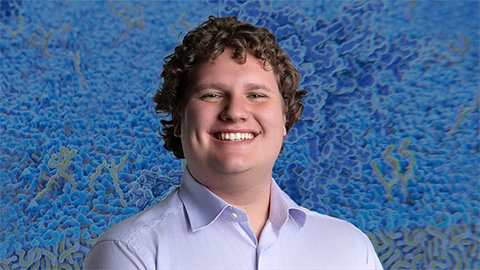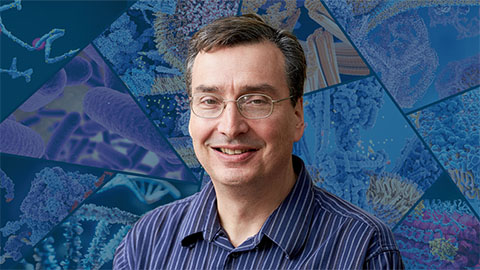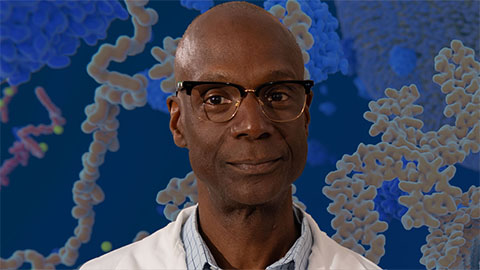Kountz tracks methyls in microbe metabolism
Duncan Kountz became interested in microbial biochemistry through a seemingly standard source: a textbook. But this wasn't a textbook assigned for class or research — he chose it himself because it seemed interesting, a habit he started in high school.

"Textbooks help me expand what I'm exposed to," Kountz said, "and I find them perfectly tolerable as long as they're on a subject I'm interested in."
The habit helped him prepare for a career in science, which he knew he wanted to pursue from the time he was in high school. Following a family legacy, he attended Ohio State University and sought research opportunities. He started out in a developmental biology lab, but that textbook, "The Physiology and Biochemistry of Prokaryotes," inspired a move to microbial metabolism. He contacted Joseph Krzycki, an OSU researcher in the field, and joined Krzycki's lab as a sophomore.
"Complexity and diversity really interest me, and I found that in microbial physiology, those are both on display," Kountz said. "Microbes may seem like they're a simple system, but they're also amenable to detailed work."
The Krzycki lab was finishing a project on an enzyme belonging to a superfamily of methyltransferases, and Kountz wanted to investigate similar enzymes in the context of the gut microbiome. He observed that a particular gut bacterium, Eubacterium limosum, encoded many of these enzymes and could utilize several unusual molecules for its growth. He focused on one in particular, carnitine, and tracked down the enzymes responsible for its metabolism.
His research shows how microbial metabolism can affect both microbial prosperity and the health of the human host, as carnitine metabolism can produce toxic byproducts. Kountz was excited about the findings, in part for this potential real-world applicability.
"I think we are really at the dawn of using microbes to solve problems," he said. "I'm excited about the idea of engineering or finding new microbes with interesting properties that we can exploit to make human life better."
Now a fourth-year Ph.D. student in Emily Balskus' lab at Harvard, Kountz said his textbook count currently exceeds 100.
Methyl-removing enzyme diverts toxin precursor
Gut bacteria can produce harmful compounds as a byproduct of their normal metabolism. Carnitine, a quaternary amine found abundantly in red meat, can lead to production of a toxin precursor called trimethylamine, or TMA, during digestion. TMA is converted in the liver to TMA oxide, a marker of cardiovascular disease.
Duncan Kountz and colleagues at Ohio State showed that the gut bacteria Eubacterium limosum can use carnitine as fuel, thereby potentially curbing TMA production. They also identified a new metabolite, called norcarnitine, produced by demethylation of carnitine.
Seeking to identify the enzymes involved in this metabolic transformation, Kountz noticed that E. limosum encoded many enzymes in the MttB superfamily. MttB proteins are involved in methyl transfer reactions.
Kountz characterized the enzymes involved in this pathway and identified a methyltransferase, MtcB, that demethylates carnitine and shuttles the product into pathways responsible for energy utilization and biogenesis.
The study highlights how metabolic activities in gut microbia may promote health by preventing production of toxin precursors.
Enjoy reading ASBMB Today?
Become a member to receive the print edition four times a year and the digital edition monthly.
Learn moreGet the latest from ASBMB Today
Enter your email address, and we’ll send you a weekly email with recent articles, interviews and more.
Latest in People
People highlights or most popular articles

Designing life’s building blocks with AI
Tanja Kortemme, a professor at the University of California, San Francisco, will discuss her research using computational biology to engineer proteins at the 2026 ASBMB Annual Meeting.

Jordahl named Gilliam Fellow
He will receive three years of funding to support his thesis research.

Bibel named assistant professor
She began her position at Loyola Marymount University in August 2025.

Unraveling the language of histones
Philip Cole presented his research on how posttranslational modifications to histones are involved in gene expression and how these modifications could be therapeutically targeted to treat diseases like cancer.

Cotruvo named Blavatnik award finalist
He received a $15,000 prize and was honored at a gala in October.

Phosphatases and pupils: A dual legacy
Yale professor Anton Bennett explores how protein tyrosine phosphatases shape disease, while building a legacy of mentorship that expands opportunity and fuels discovery in biochemistry and molecular biology.

